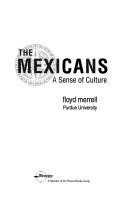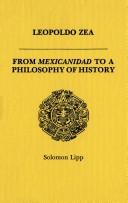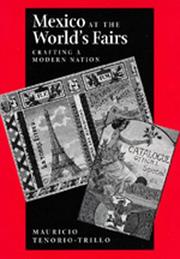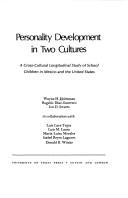| Listing 1 - 10 of 10 |
Sort by
|

ISBN: 0813340438 0813340446 Year: 2003 Publisher: Boulder Westview
Abstract | Keywords | Export | Availability | Bookmark
 Loading...
Loading...Choose an application
- Reference Manager
- EndNote
- RefWorks (Direct export to RefWorks)

ISBN: 9780889207240 0889207240 0889200793 9780889200791 9781554585199 1554585198 1282232940 9786613810687 Year: 1980 Publisher: Waterloo, Ont. Wilfrid Laurier University Press
Abstract | Keywords | Export | Availability | Bookmark
 Loading...
Loading...Choose an application
- Reference Manager
- EndNote
- RefWorks (Direct export to RefWorks)
The author analyzes Mexican national identity in the context of the philosophy of Leopoldo Zea, contemporary Mexican thinker. He attempts to establish national character traits peculiar to Mexico, using sociological, psychological, historical, and philosophical approaches. He then shows how Zea deals with the problem of Mexican identity and how he relates specifically Mexican concepts to universal philosophic and historic thought. Ranging widely over many disciplines, this scholarly study will be particularly valuable to readers familiar with philosophy, sociology, and psychology.
Book
ISBN: 6074624690 9786074624694 9786074621280 6074621284 Year: 2010 Publisher: México, D.F.
Abstract | Keywords | Export | Availability | Bookmark
 Loading...
Loading...Choose an application
- Reference Manager
- EndNote
- RefWorks (Direct export to RefWorks)
National characteristics, Mexican. --- Group identity --- Características nacionales mexicanas. --- Identidad de grupo --- México. --- Collective identity --- Community identity --- Cultural identity --- Social identity --- Identity (Psychology) --- Social psychology --- Collective memory --- Mexican national characteristics

ISBN: 0520202678 0585206961 Year: 1996 Volume: 35 Publisher: Berkeley : University of California Press,
Abstract | Keywords | Export | Availability | Bookmark
 Loading...
Loading...Choose an application
- Reference Manager
- EndNote
- RefWorks (Direct export to RefWorks)
"Cosmopolitan approach frames the issue within a more international setting than is common in works about a single Latin American country. Recommended"--Handbook of Latin American Studies, v. 58.
Trade shows --- Exhibitions --- Salons professionnels --- Expositions --- History --- Histoire --- Mexico --- Mexique --- Civilization --- Civilisation --- National characteristics, Mexican --- Technology - General --- Engineering & Applied Sciences --- Mexican national characteristics --- Exhibits --- Expos (Exhibitions) --- Industrial arts --- Industrial exhibitions --- International exhibitions --- Technology --- World's fairs --- Trade expositions --- Trade fairs --- Sales promotion --- Fairs --- History.
Book
ISBN: 0804793107 9780804793100 9780804788076 0804788073 9780804793070 0804793077 Year: 2020 Publisher: Stanford, CA : Stanford University Press,
Abstract | Keywords | Export | Availability | Bookmark
 Loading...
Loading...Choose an application
- Reference Manager
- EndNote
- RefWorks (Direct export to RefWorks)
Italy has grappa, Russia has vodka, Jamaica has rum. Around the world, certain drinks—especially those of the intoxicating kind—are synonymous with their peoples and cultures. For Mexico, this drink is tequila. For many, tequila can conjure up scenes of body shots on Cancún bars and coolly garnished margaritas on sandy beaches. Its power is equally strong within Mexico, though there the drink is more often sipped rather than shot, enjoyed casually among friends, and used to commemorate occasions from the everyday to the sacred. Despite these competing images, tequila is universally regarded as an enduring symbol of lo mexicano. ¡Tequila! Distilling the Spirit of Mexico traces how and why tequila became and remains Mexico's national drink and symbol. Starting in Mexico's colonial era and tracing the drink's rise through the present day, Marie Sarita Gaytán reveals the formative roles played by some unlikely characters. Although the notorious Pancho Villa was a teetotaler, his image is now plastered across the labels of all manner of tequila producers—he's even the namesake of a popular brand. Mexican films from the 1940's and 50's, especially Western melodramas, buoyed tequila's popularity at home while World War II caused a spike in sales within the whisky-starved United States. Today, cultural attractions such as Jose Cuervo's Mundo Cuervo and the Tequila Express let visitors insert themselves into the Jaliscan countryside—now a UNESCO-protected World Heritage Site—and relish in the nostalgia of pre-industrial Mexico. Our understanding of tequila as Mexico's spirit is not the result of some natural affinity but rather the cumulative effect of U.S.-Mexican relations, technology, regulation, the heritage and tourism industries, shifting gender roles, film, music, and literature. Like all stories about national symbols, the rise of tequila forms a complicated, unexpected, and poignant tale. By unraveling its inner workings, Gaytán encourages us to think critically about national symbols more generally, and the ways in which they both reveal and conceal to tell a story about a place, a culture, and a people. In many ways, the story of tequila is the story of Mexico.
Alcoholic beverages -- Mexico -- History. --- Drinking of alcoholic beverages -- Mexico -- History. --- National characteristics, Mexican. --- Tequila -- Mexico -- History. --- Tequila --- Alcoholic beverages --- Drinking of alcoholic beverages --- National characteristics, Mexican --- Chemical & Materials Engineering --- Engineering & Applied Sciences --- Chemical Engineering --- Mexican national characteristics --- Alcohol consumption --- Alcohol drinking --- Alcohol use --- Alcoholic beverage consumption --- Consumption of alcoholic beverages --- Drinking problem --- Liquor problem --- Social drinking --- Alcoholism --- Temperance --- Intoxicants --- Alcohol --- Beverages --- Liquors --- Mescal --- History
Book
ISBN: 1316679950 1316680126 1316680290 1316680460 1316680975 131641597X 1107129036 1107569613 1316678938 9781316680971 9781316415979 9781107129030 9781107569614 9781107129030 9781107569614 Year: 2016 Publisher: Cambridge : Cambridge University Press,
Abstract | Keywords | Export | Availability | Bookmark
 Loading...
Loading...Choose an application
- Reference Manager
- EndNote
- RefWorks (Direct export to RefWorks)
Modern Mexico derives many of its richest symbols of national heritage and identity from the Aztec legacy, even as it remains a predominantly Spanish-speaking, Christian society. This volume argues that the composite, neo-Aztec flavor of Mexican identity was, in part, a consequence of active efforts by indigenous elites after the Spanish conquest to grandfather ancestral rights into the colonial era. By emphasizing the antiquity of their claims before Spanish officials, native leaders extended the historical awareness of the colonial regime into the pre-Hispanic past, and therefore also the themes, emotional contours, and beginning points of what we today understand as 'Mexican history'. This emphasis on ancient roots, moreover, resonated with the patriotic longings of many creoles, descendants of Spaniards born in Mexico. Alienated by Spanish scorn, creoles associated with indigenous elites and studied their histories, thereby reinventing themselves as Mexico's new 'native' leadership and the heirs to its prestigious antiquity.
National characteristics, Mexican --- Caciques (Indian leaders) --- Creoles --- Elite (Social sciences) --- Elites (Social sciences) --- Leadership --- Power (Social sciences) --- Social classes --- Social groups --- Racially mixed people --- Cassiques (Indian leaders) --- Indians --- Mexican national characteristics --- History. --- Kings and rulers --- Assimilation (Sociology) --- Mexico --- History --- Cultural assimilation --- Anthropology --- Socialization --- Acculturation --- Cultural fusion --- Emigration and immigration --- Minorities --- 1540-1810 --- Spanish Colony, Period as (Mexico)
Book
ISBN: 0292745362 0292745354 Year: 2013 Publisher: Austin : University of Texas Press,
Abstract | Keywords | Export | Availability | Bookmark
 Loading...
Loading...Choose an application
- Reference Manager
- EndNote
- RefWorks (Direct export to RefWorks)
Since the colonial era, Mexican art has emerged from an ongoing process of negotiation between the local and the global, which frequently involves invention, synthesis, and transformation of diverse discursive and artistic traditions. In this pathfinding book, María Fernández uses the concept of cosmopolitanism to explore this important aspect of Mexican art, in which visual culture and power relations unite the local and the global, the national and the international, the universal and the particular. She argues that in Mexico, as in other colonized regions, colonization constructed power dynamics and forms of violence that persisted in the independent nation-state. Accordingly, Fernández presents not only the visual qualities of objects, but also the discourses, ideas, desires, and practices that are fundamental to the very existence of visual objects. Fernández organizes episodes in the history of Mexican art and architecture, ranging from the seventeenth century to the end of the twentieth century, around the consistent but unacknowledged historical theme of cosmopolitanism, allowing readers to discern relationships among various historical periods and works that are new and yet simultaneously dependent on their predecessors. She uses case studies of art and architecture produced in response to government commissions to demonstrate that established visual forms and meanings in Mexican art reflect and inform desires, expectations, memories, and ways of being in the world—in short, that visual culture and cosmopolitanism are fundamental to processes of subjectification and identity.
Art, Mexican --- Architecture --- Eclecticism in art --- Eclecticism in architecture --- National characteristics, Mexican. --- Themes, motives. --- Mexican national characteristics --- Beaux-Arts architecture --- Beaux-Arts design --- Architecture, Modern --- Art, Modern --- Architecture, Western (Western countries) --- Building design --- Buildings --- Construction --- Western architecture (Western countries) --- Art --- Building --- Mexican art --- Tepito Arte Acá (Group of artists) --- Design and construction --- Architecture, Primitive

ISBN: 0292775121 Year: 1975 Publisher: Austin University of Texas press
Abstract | Keywords | Export | Availability | Bookmark
 Loading...
Loading...Choose an application
- Reference Manager
- EndNote
- RefWorks (Direct export to RefWorks)
#SBIB:39A9 --- 159.923.2 --- Cross-Cultural Comparison. --- Personality Development. --- 316.736 --- Children --- -Children --- -National characteristics, Mexican --- Personality and culture --- -Personality and culture --- -Civilization and personality --- Culture and personality --- Civilization --- Culture --- Ethnopsychology --- Mexican national characteristics --- Childhood --- Kids (Children) --- Pedology (Child study) --- Youngsters --- Age groups --- Families --- Life cycle, Human --- Development, Personality --- Child Development --- Growth --- Medische antropologie / gezondheid / handicaps --- Persoonlijkheidsontwikkeling. Zelfbewustzijn. Ego --- Enculturatie. Socialisatie --- -Medische antropologie / gezondheid / handicaps --- 316.736 Enculturatie. Socialisatie --- 159.923.2 Persoonlijkheidsontwikkeling. Zelfbewustzijn. Ego --- -Mexican national characteristics --- Civilization and personality --- Transcultural Studies --- Comparison, Cross-Cultural --- Comparisons, Cross-Cultural --- Cross Cultural Comparison --- Cross-Cultural Comparisons --- Studies, Transcultural --- Study, Transcultural --- Transcultural Study --- Cultural Characteristics --- Cross-Cultural Comparison --- Personality Development --- -Childhood --- -Transcultural Studies --- -Cross-Cultural Comparison --- -Personality and culture -
Book
ISBN: 9788484895305 9783865275653 9789567019564 Year: 2010 Publisher: Madrid Iberoamericana
Abstract | Keywords | Export | Availability | Bookmark
 Loading...
Loading...Choose an application
- Reference Manager
- EndNote
- RefWorks (Direct export to RefWorks)
Historical linguistics --- Sociolinguistics --- Spanish language --- anno 1500-1799 --- anno 1800-1899 --- Spain --- Mexico --- Languages in contact --- National characteristics, Mexican --- Translating and interpreting --- Interpretation and translation --- Interpreting and translating --- Language and languages --- Literature --- Translation and interpretation --- Translators --- Mexican national characteristics --- Areal linguistics --- Translating --- Anáhuac --- Estados Unidos Mexicanos --- Maxico --- Méjico --- Mekishiko --- Meḳsiḳe --- Meksiko --- Meksyk --- Messico --- Mexique (Country) --- República Mexicana --- Stany Zjednoczone Meksyku --- United Mexican States --- United States of Mexico --- מקסיקו --- メキシコ --- Languages --- History.
Book
ISBN: 6076284730 Year: 1945 Publisher: El Colegio de México
Abstract | Keywords | Export | Availability | Bookmark
 Loading...
Loading...Choose an application
- Reference Manager
- EndNote
- RefWorks (Direct export to RefWorks)
Con esta serie de jornadas el Colegio de México presenta un amplio marco a la colaboración: desde las cuestiones filosóficas conexas hasta los estudios de las ciencias sociales más particular y especializada; pero viendo también dibujados dentro de ese marco estos propósitos fundamentales: 1. Exponer el estado actual de la ciencia, de conocimiento imprescindible, como punto de partida; 2 Examinar y discutir, en particular, los problemas peculiares de la ciencia en los países y 3. Contribuir en lo posible al desarrollo de la ciencia social en marcha
Spanish-American literature. --- Mexico --- Civilization. --- Latin American literature --- Spanish literature --- National characteristics, Mexican. --- Mexicains. --- Fernández de Lizardi, Jose Joaquín, --- Díaz de Castillo, Bernal, --- Casas, Bartolome de las, --- Casa, Bartolome de las, --- Mexico. --- Mexique --- Vie intellectuelle. --- Civilisation. --- Mexican national characteristics --- Barbarism --- Civilisation --- Auxiliary sciences of history --- Culture --- World Decade for Cultural Development, 1988-1997 --- Anáhuac --- Estados Unidos Mexicanos --- Maxico --- Méjico --- Mekishiko --- Meḳsiḳe --- Meksiko --- Meksyk --- Messico --- Mexique (Country) --- República Mexicana --- Stany Zjednoczone Meksyku --- United Mexican States --- United States of Mexico --- מקסיקו --- メキシコ --- Biography: literary
| Listing 1 - 10 of 10 |
Sort by
|

 Search
Search Feedback
Feedback About
About Help
Help News
News